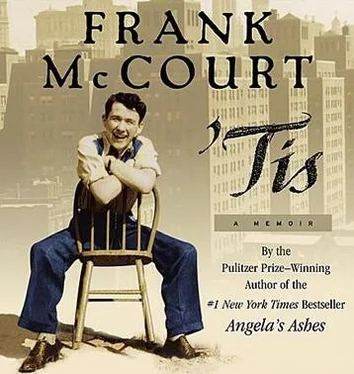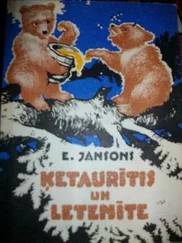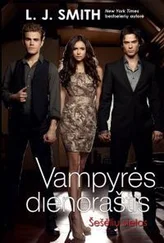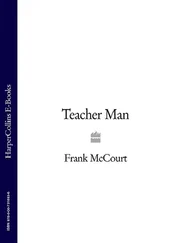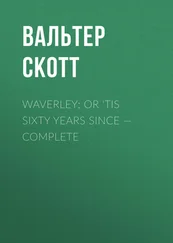Frank McCourt - 'Tis
Здесь есть возможность читать онлайн «Frank McCourt - 'Tis» весь текст электронной книги совершенно бесплатно (целиком полную версию без сокращений). В некоторых случаях можно слушать аудио, скачать через торрент в формате fb2 и присутствует краткое содержание. Жанр: Старинная литература, на английском языке. Описание произведения, (предисловие) а так же отзывы посетителей доступны на портале библиотеки ЛибКат.
- Название:'Tis
- Автор:
- Жанр:
- Год:неизвестен
- ISBN:нет данных
- Рейтинг книги:3 / 5. Голосов: 1
-
Избранное:Добавить в избранное
- Отзывы:
-
Ваша оценка:
- 60
- 1
- 2
- 3
- 4
- 5
'Tis: краткое содержание, описание и аннотация
Предлагаем к чтению аннотацию, описание, краткое содержание или предисловие (зависит от того, что написал сам автор книги «'Tis»). Если вы не нашли необходимую информацию о книге — напишите в комментариях, мы постараемся отыскать её.
'Tis — читать онлайн бесплатно полную книгу (весь текст) целиком
Ниже представлен текст книги, разбитый по страницам. Система сохранения места последней прочитанной страницы, позволяет с удобством читать онлайн бесплатно книгу «'Tis», без необходимости каждый раз заново искать на чём Вы остановились. Поставьте закладку, и сможете в любой момент перейти на страницу, на которой закончили чтение.
Интервал:
Закладка:
When Michael saw us he started to cry, Berries, berries. He stopped when we told him, Dad is out the road in Rosbrien getting your berries so will you quit the crying and let us have our fried bread and tea.
We could have eaten a whole loaf between us but my mother said, Leave some for your father. She shook her head. He’s such a fool going all the way back there for the berries. Then she looked at Michael the way he was standing at the door looking up the lane for a sign of my father and she shook her head in a smaller way.
Soon Michael spotted my father and he was gone up the lane calling out, Dad, Dad, did you get the berries? We could hear Dad, In a minute, Michael, in a minute.
He stood the spade and fork in a corner and emptied his coat pockets on to the table. Berries he brought, the great black juicy berries you find at the tops and backs of bushes beyond the reach of children, berries he plucked in the dark of Rosbrien. My mouth watered and I asked my mother if I could have a berry and she said, Ask Michael, they’re his.
I didn’t have to ask him. He handed me the biggest of the berries, the juiciest, and he handed one to Malachy. He offered berries to my mother and father but they said no thanks, they were his berries. He offered Malachy and me another berry each and we took them. I thought if I had berries like that I’d keep them all for myself but Michael was different and maybe he didn’t know any better because he was four.
After that we went to the plot every day but Sunday and cleared it of rocks and stones till we reached the earth and helped my father with the planting of potatoes, carrots and cabbage. There were times we left him and roamed the road, hunting for berries and eating so many it gave us the runs.
My father said in no time we’d be digging up our crop but he wouldn’t be here to do it. There was no work in Limerick and the En-glish were looking for people to work in their war factories. It was hard for him to think of working for the English after what they did to us but the money was tempting and as long as the Americans had entered the war it was surely a just cause.
He went off to England with hundreds of men and women. Most sent money home but he spent his in the pubs of Coventry and forgot he had a family. My mother had to borrow from her own mother and ask for credit from Kathleen O’Connell’s grocery shop. She had to beg for food from the St. Vincent de Paul Society or wherever she could get it. She said it would be a great relief to us and we’d be saved when the time came to dig up our spuds, our carrots, our lovely heads of cabbage. Oh, we’d have a right feed then and if God was good He might send us a nice piece of ham and that wasn’t asking too much when you lived in Limerick, the ham capital of all Ireland.
The day came and she put the new baby, Alphie, in the pram. She borrowed a coal sack from Mr. Hannon next door. We’ll fill it, she said. I carried the fork and Malachy the spade so that he wouldn’t be knocking people’s eyes out with the prongs. My mother said, Don’t be swinging those tools or I’ll give ye a good clitther on the gob.
A smack in the mouth.
When we arrived at Rosbrien there were other women digging in the plots. If there was a man in the field he was old and not able for the work in England. My mother said hello across the low wall to this woman and that woman and when they didn’t answer back she said, They must be all gone deaf with the bending over.
She left Alphie in the pram outside the plot wall and told Michael mind the baby and don’t be hunting for berries. Malachy and I jumped over the wall but she had to sit on it, swing her legs over, and get down on the other side. She sat a minute and said, There’s nothing in the world like a new potato with salt and butter. I’d give me two eyes for it.
We lifted the spade and fork and went to the plot but for all we got there we might as well have stayed at home. The earth was still fresh from being dug and turned over and white worms crawled in the holes where the potatoes and carrots and heads of cabbage used to be.
My mother said to me, Is this the right plot?
’Tis.
She walked the length of it and back. The other women were busy bending over and picking things out of the ground. I could see she wanted to say something to them but I could see also she knew it was no use. I went to pick up the spade and fork and she barked at me, Leave them. They’re no use to us now with everything gone. I wanted to say something but her face was so white I was afraid she’d hit me and I backed away, over the wall.
She came over the wall herself, sitting, swinging her legs, sitting again till Michael said, Mam, can I go hunting berries?
You can, she said. You might as well.
If Mr. Calitri likes this story he might make me read it to the class and they’ll roll their eyes and say, More misery. The girls might have felt sorry for me over the bed but that’s enough, surely. If I go on writing about my miserable childhood they’ll say, Stop, stop, life is hard enough, we have our own troubles. So, from now on, I’ll write stories about my family moving to the suburbs of Limerick where everyone is well fed and clean from taking a bath at least once a week.
31
Paddy Arthur McGovern warns me that if I keep on listening to that noisy jazz music I’ll wind up like the Lennon brothers so American I’ll forget I’m Irish altogether and what will I be then. It’s no use telling him how the Lennons could be so excited about James Joyce. He’d say, Oh, James Joyce, me arse. I grew up in the County Cavan and no one there ever heard of him and if you don’t watch your step you’ll be running to Harlem and jitterbuggin’ with Negro girls.
He’s going to an Irish dance on Saturday night and if I have any sense I’ll go with him. He wants to dance only with Irish girls because if you dance with Americans you never know what you’re getting.
At the Jaeger House on Lexington Avenue Mickey Carton is up there with his band Ruthie Morrissey singing “A Mother’s Love Is a Blessing.” A great crystal ball revolves on the ceiling, flecking the ballroom with floating silver spots. Paddy Arthur is no sooner in the door than he’s waltzing around with the first girl he asks to dance. He has no trouble getting girls to dance and why should he with his six feet one, his black curly hair, his rich black eyebrows, his blue eyes, the dimple on his chin, the cool way he has of offering his hand that says, Come up, girl, so that the girl would never dream of saying no to this vision of a man and when they move out on the floor, no matter what class of a dance it is, waltz, fox-trot, lindy, two-step, he steers her around with hardly a glance at her and when he leads her back to her seat she’s the envy of every giggling girl on the seats along the wall.
He comes to the bar where I’m having a beer for the courage that might be in it. He wants to know why I’m not up dancing. Sure what’s the use of coming here if you don’t dance with them grand girls along the wall?
He’s right. The grand girls sitting along the wall are like the girls in Cruise’s Hotel in Limerick except they’re wearing dresses the likes of which you’d never see in Ireland, silk and taffeta and materials strange to me, pink, puce, light blue, ornamented here and there with lacy bows, dresses with no shoulders so stiff at the front that when the girl turns to the right the dress stays where it is. Their hair is trapped with pins and combs for fear it might tumble rich to the shoulders. They sit with their hands in their laps holding fancy purses and they smile only when they talk to each other. Some sit dance after dance, ignored by the men, till they’re forced to dance with the girls beside them. They clump across the floor and when the dance ends move to the bar for lemonade or orange squash, the drink of girl couples.
Читать дальшеИнтервал:
Закладка:
Похожие книги на «'Tis»
Представляем Вашему вниманию похожие книги на «'Tis» списком для выбора. Мы отобрали схожую по названию и смыслу литературу в надежде предоставить читателям больше вариантов отыскать новые, интересные, ещё непрочитанные произведения.
Обсуждение, отзывы о книге «'Tis» и просто собственные мнения читателей. Оставьте ваши комментарии, напишите, что Вы думаете о произведении, его смысле или главных героях. Укажите что конкретно понравилось, а что нет, и почему Вы так считаете.
